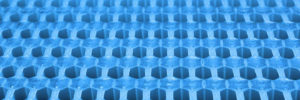Belgium-based EconCore has announced a partnership involving AZL, Audi and others to establish the potential of using composites for battery housings. This eight-month collaborative project will assess the technical challenges, opportunities and benefits of developing battery casings for EVs using a variety of materials, including thermoplastics.
The project has been established by the industry network group, AZL, which specializes in composite-based lightweight technologies. Today’s battery housings are almost entirely made from aluminum or steel. The industry membership group believes there is a potential to use lighter composite materials.
EconCore COO Tomasz Czarnecki said, “After successfully establishing the use of the technology in automotive interiors, we feel there is tremendous potential in using composite materials for battery housings, and EconCore is now actively working with Audi and other industrial partners to explore opportunities, and to learn how the thermoplastic honeycomb technology can be applied in this area.”
The first phase will focus on understanding the potential opportunities and challenges. For EconCore, this means pre-selecting thermoplastic materials, using different composite skin layers and working through various geometrical designs to optimize the honeycomb material with the most desirable characteristics.
Czarnecki added, “There’s no doubt there are some interesting opportunities to reduce weight using composite materials. We believe there are even greater potential benefits from using honeycomb sandwich materials, which have incredible strength, [and are] extremely light, compared to aluminum or steel alternatives.”
EconCore already has experience using honeycomb material in vehicle interiors, which can be compression-molded to produce three-dimensional shapes. If the initial phase goes well, the plan is to progress to a prototyping stage.
Source: EconCore
Source: Electric Vehicles Magazine


